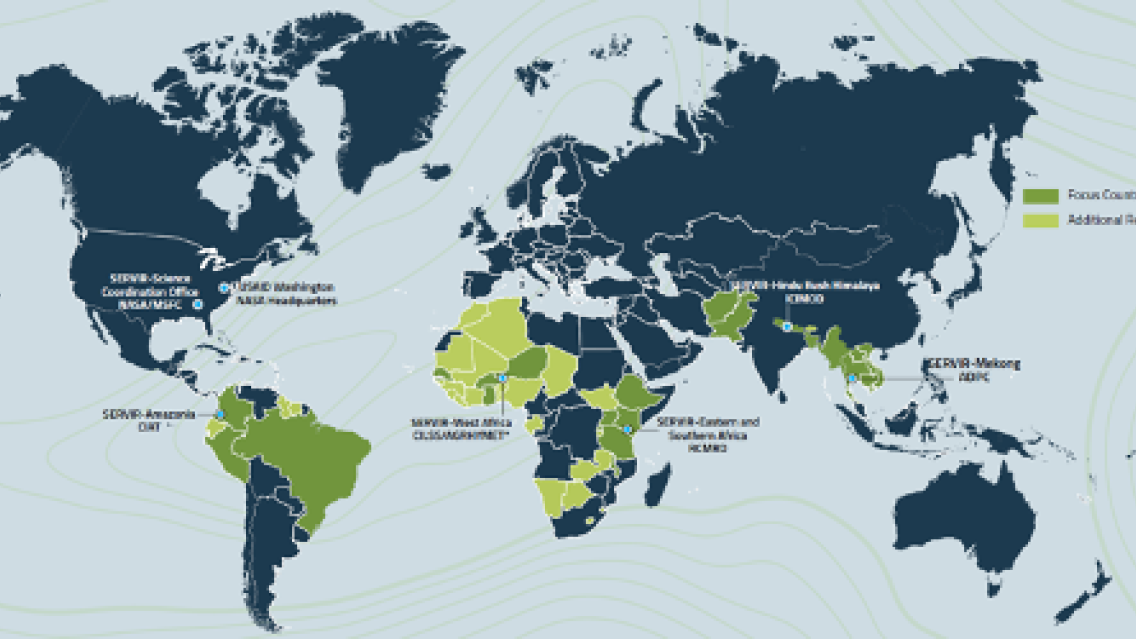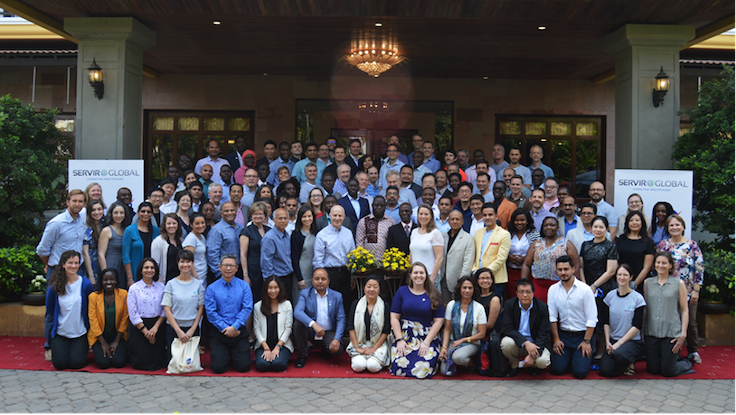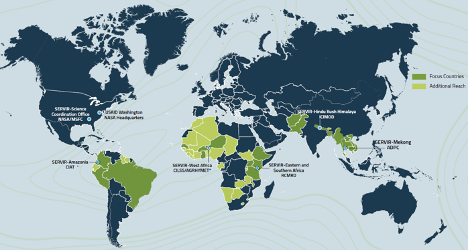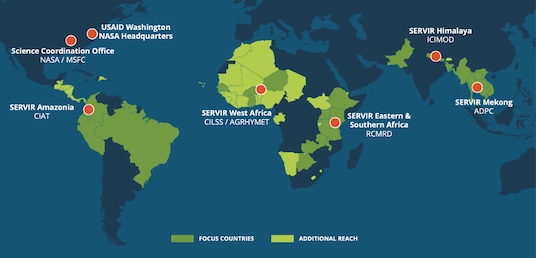Out in Front: How SERVIR's Locally Led Development is Driving Climate Action

Climate change poses a fundamental threat to human and natural systems around the world. It is causing sea level rise, more frequent and severe weather events, and ecosystem collapse. Growing seasons are changing, weather patterns are being disrupted, and sources of food and water are becoming less reliable. Much of the world is already experiencing these negative effects of climate change, and it is disproportionately impacting the world’s most marginalized populations.
In response, the United States reinvigorated its climate action approach by officially rejoining the Paris Climate Agreement on February 19, 2021. Understanding that there must be a unified response to the climate crisis, President Biden stated emphatically: “We can no longer delay or do the bare minimum to address climate change. This is a global, existential crisis, and we’ll all suffer the consequences if we fail.”
New, Bold USAID Climate Initiatives
Working in more than 45 countries, the U.S. Agency for International Development (USAID) is urgently addressing these threats to global health, livelihoods, and security. The Agency strives to reduce emissions, transition to renewable energy, protect vulnerable ecosystems, strengthen climate change adaptation and resilience, and support the stream of capital toward climate-positive investments.
In early November 2021, the U.S. government announced a series of key climate change initiatives, goals, and partnerships, many of which will be spearheaded by USAID, to advance climate priorities.
On November 1, 2021, at the World Leaders’ Summit, President Biden announced an ambitious set of goals to advance the President’s Emergency Plan for Adaptation and Resilience (PREPARE). PREPARE will leverage USAID’s broad experience to support equitable and inclusive climate resilience and help developing countries and communities around the world adapt to and manage the impacts of climate change. By 2030, PREPARE will support more than 500 million people through locally led programs that strengthen adaptation to climate change. PREPARE is a cornerstone in the U.S. government’s response to the increasing impacts of the global climate crisis.
On November 4, 2021, USAID Administrator Samantha Power gave a speech at Georgetown University to share a bold, inclusive vision for the future of international development and USAID. As part of this initiative, Administrator Power stated that USAID was renewing its focus on locally led development efforts and would increase USAID funding that goes directly to local partners – from 5.6% (current) to at least 25% (projected) of the USAID annual budget – within the next four years. By the end of 2030, Administrator Power noted that “more than 50% of our programming…will need to place local communities in the lead to either co-design a project, set priorities, drive implementation, or evaluate the impact of our programs.”

Power remarked that these local partners can offer “a scale that no single development agency can truly reach.” She continued: “When we partner with these local NGOs and businesses, we have an opportunity to double our impact—to not just manage a project and deliver results, which is important, but to grow the local capacity of that business or organization so its impact will be sustained long after its relationship with USAID ends.”
Then, on November 8, 2021, at COP26 in Glasgow, Scotland, Gillian Caldwell, the USAID Climate Change Coordinator and Deputy Assistant Administrator, announced that USAID had signed on to the Principles for Locally Led Adaptation. These principles support approaches that give local actors greater power and resources to build resilience to climate change. USAID joins a growing list of more than 70 governments, leading global institutions, and local and international NGOs that have already sanctioned these locally led adaptation principles and are advocating their endorsement by others.
SERVIR's Mantra: "Connecting Space to Village"
A joint initiative of NASA and USAID, SERVIR works in partnership with leading regional organizations worldwide to help developing countries use information provided by Earth observing satellites and Earth science to address challenges in food security, water resources, weather and climate, land use, disasters, and air quality.
SERVIR continues to lead the field in building lasting capacity of regional, national, and local partners through the use of its services – with a focus on geospatial technology, data, and solutions. These services help to empower decision-makers to better address local challenges. SERVIR’s successful approach to the design and delivery of geospatial information services is anchored in a user-centric, collaborative process.
Since its launch in 2005, SERVIR has grown into a network of hubs with leading technical organizations and consortium members that are turning world-class research and data into meaningful insights to help people across Africa, Asia, and South America to better manage complex development and environmental challenges. With activities in more than 45 countries, SERVIR has co-developed 47 services, collaborated with more than 600 institutions, and trained more than 10,000 individuals – an example of how SERVIR improves local capacity to achieve sustainable development results. And SERVIR continues to grow: USAID’s press release on PREPARE announced that SERVIR will “bolster climate adaptation and resilience in Central America by expanding critical climate information and services to the region.”

Through the combined efforts of regional hubs, and with technical support from USAID, NASA, and U.S.- based science collaborators, SERVIR has been front and center at promoting locally led development and climate action around the world. The SERVIR Global network demonstrates the value of Earth observation and collaborative science and is strategically placed to support these new climate initiatives of the U.S. government and USAID.
A Brief Introduction: SERVIR's Five Hubs & Extended Network
SERVIR brings together a variety of specialists from diverse backgrounds to create a unique, global team. SERVIR partners with locally led, applied science institutions. These local partners have unique relationships with the governments, NGOs, and private sector actors within the regions, countries, and communities where they work. By working hand in hand with local users, SERVIR partners take a co-development approach to the design and delivery of services that help address stakeholder-identified problems. SERVIR’s global network of hubs and partnering institutions include:
| SERVIR Hub | Partnering Institution | Location |
| SERVIR Eastern & Southern Africa | The Regional Centre for Mapping of Resources for Development (RCMRD) |
Nairobi, Kenya |
| SERVIR Hindu Kush Himalaya |
The International Centre for Integrated Mountain Development (ICIMOD) |
Kathmandu, Nepal |
| SERVIR Mekong | The Asian Disaster Preparedness Center (ADPC) | Bangkok, Thailand |
| SERVIR West Africa |
The Agrometeorology, Hydrology and Meteorology (AGRHYMET) Regional Center* |
Niamey, Niger |
| SERVIR Amazonia |
Alliance of Bioversity International and the International Center for Tropical Agriculture (CIAT) |
Cali, Colombia |
In addition to the hubs, the SERVIR team includes the SERVIR Science Coordination Office (SCO), NASA headquarters and centers in the United States, USAID headquarters and missions around the world, 20 U.S.-based universities, and other institutions across the globe.


Fostering Locally Led Development Across SERVIR's Five Hubs
Many communities around the world lack easy access to geospatial data, making risk identification and management an enormous challenge. SERVIR is working to fill these gaps and strengthen capacity for risk-informed decision-making. SERVIR collaborators and analysts work side by side with local users to integrate satellite data and information into tools, models, and services. In doing this, SERVIR strengthens capacity among users – so they can better manage risk, make climate-informed decisions, and improve the everyday lives of the people within their communities.
The links below will take you on a deeper dive, providing examples of how SERVIR’s five hubs are working with local governments and communities around the world to manage challenges – in areas of food security, water resources and hydroclimatic disasters, weather and climate, land use, and air quality – that are made increasingly more difficult by a changing climate.
- SERVIR Eastern & Southern Africa works to reduce food insecurity in Kenya, manage water resources in Tanzania, inform land management decisions in Rwanda, and more.
- SERVIR Hindu Kush Himalaya provides drought information, monitors crop yields, provides early flood warnings, and supports women in geospatial information technology across the region.
- SERVIR Mekong works with communities to manage forest fires in Thailand, enables effective response to drought forecasting in Vietnam, and provides tools to better manage protected areas in Cambodia.
- SERVIR West Africa enables local officials in Ghana to confront harmful illicit mining practices, and allows authorities in Senegal to manage scarce resources, particularly during dry seasons.
- SERVIR Amazonia allows traditional communities to monitor illegal gold mining and other illicit activities, curb deforestation, and promote biodiversity conservation across the Amazon region.
As the impacts of climate change accelerate, SERVIR will continue to bring “Space to Village,” supporting USAID’s renewed focus on locally led development and climate action around the world.
*At the time of publication, SERVIR West Africa is now implemented by the International Crops Research Institute for the Semi-Arid Tropics (ICRISAT) in Bamako, Mali, but AGRHYMET remains a consortium partner. AGRHYMET is a subsidiary of the Permanent Inter-State committee for Drought Control in the Sahel (CILSS).

